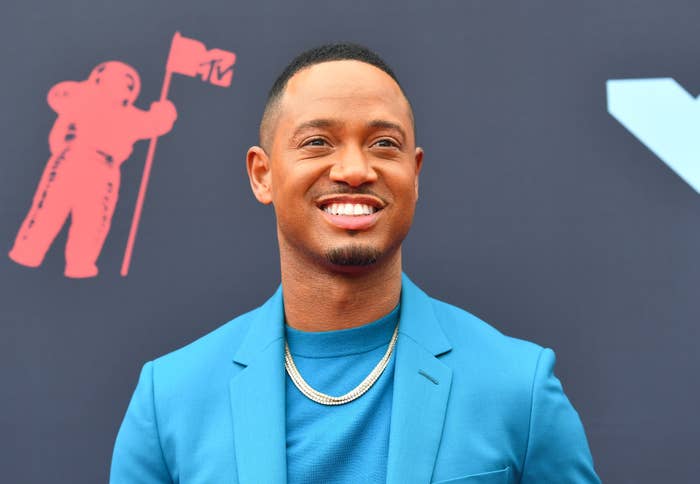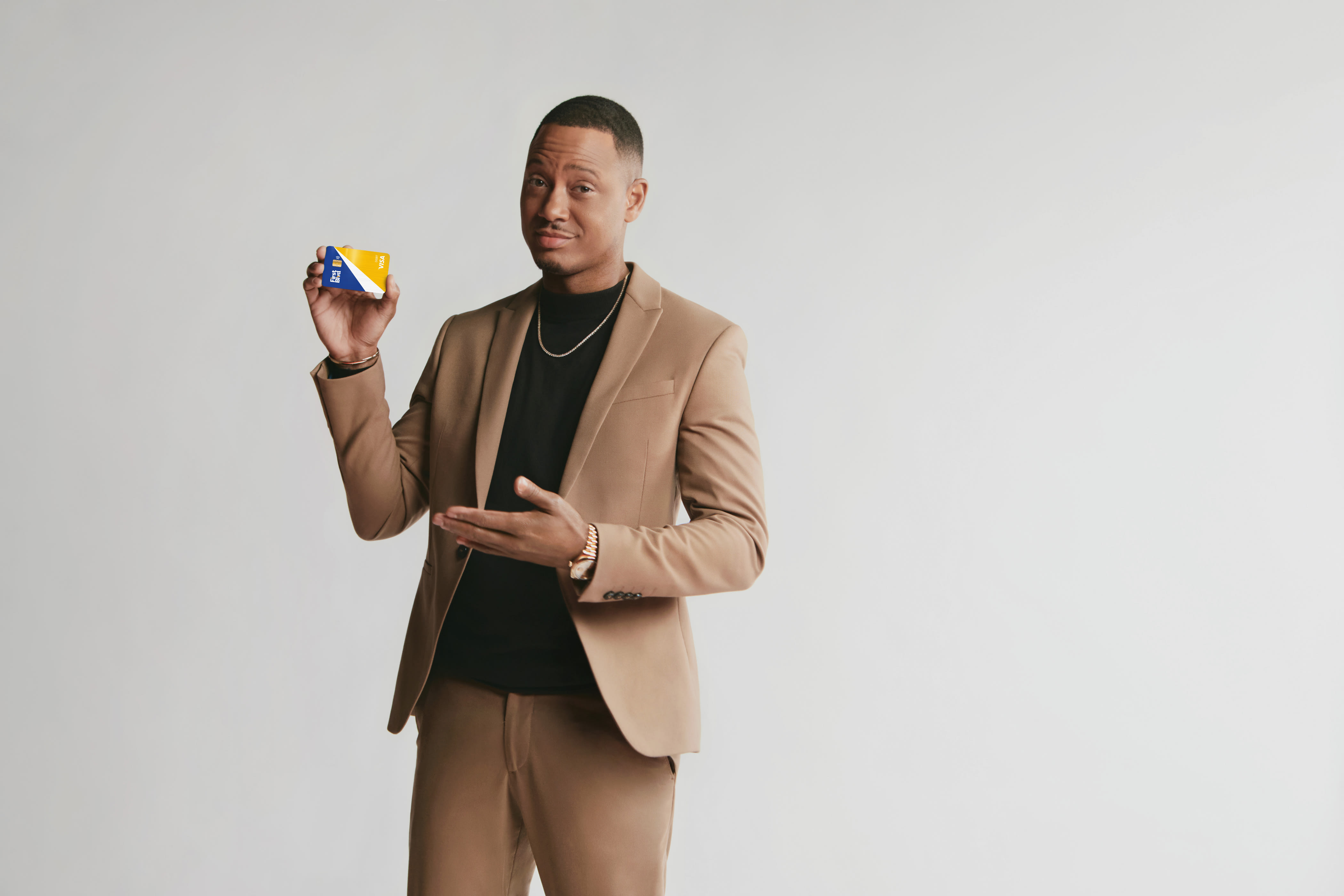
Terrence Jenkins (aka Terrence J) became a household name following his stint as106 & Park’s co-host. Since he joined BET in 2006, he has become one of the most recognized on-air personalities in pop culture. He replaced Ryan Seacrest as the co-anchor of E! News in 2012, has hosted a wide range of TV shows and is now a movie star, a book author, and an executive producer on an Oscar-nominated film. His work doesn’t stop there. As a graduate of North Carolina A&T State University, the largest historically Black university in the country, the TV personality has made it a priority to give back to his community. Jenkins spoke to Complex about executive producing Two Distant Strangers, his choice to partner with First Boulevard Bank and Aladdin Campus Dining to help students in Historically Black College and University communities.
Jenkins serves as an executive producer alongside Diddy, Jesse Williams, and Kevin Durant, in the short film created by Travon Free. The Joey Badass-starring film was nominated for an Academy Award for Best Live-Action Short Film earlier this month. Netflix recently acquired worldwide rights to Two Distant Strangers, which will debut on the streaming service on April 9. “The film is beautiful, I can’t wait for the world to see it. The director Travon is brilliant, and it’s a story that really needs to be told. I think people are really going to love it,” Jenkins told Complex. “Whenever somebody brings me a good story, and I feel like there’s a good team behind it, a solid director, writers, the right actors, I’m going to look at it and consider it really closely. When I get a project like this, it’s a no-brainer. It was like, ‘Sign me up!’”
The 29-minute film tells the story of a cartoonist named Carter James (Joey Badass) who is forced to relive the same day over and over again, a la Groundhog Day, as his never-ending attempts to get home to his dog are unsuccessful after he has a deadly encounter with a cop every day. The story is representative of the constant stories of Black people being killed by the police and having to repeatedly feel that outrage and grief with no end in sight. “With the things that have happened over decades and decades in this country, I think one of the key elements that we have to focus on is financial empowerment within our communities. The reason I’m able to do some of those things is because I’m financially empowered to help tell Black stories,” Jenkins said. “That’s why I’ve been trying to make more and more moves to help our people get that financial empowerment. So that we can continue to tell our stories, continue to push our narratives, and continue to progress as a people.”

During a year where Hollywood was on pause due to the global pandemic, the Think Like a Man star used that downtime to refocus his energy. “The past year was a scary year for all of us. One day all of us were on our way to work, on our way to dinner, on our way to the movies, and in the snap of a finger, everything changed. So for me, it just told me to never take things for granted. Every day we wake up is another opportunity, and to just never take time for granted, and never take this amazing life that we have for granted,” he said. “COVID really made me take a step back and focus on other aspects because obviously, we couldn’t be on set shooting films as easily, but I’ve loved this time to be able to focus on other things as well.”
“I spent a lot of time on my career, and I just want to focus a lot more of my time on helping others,” he added. “I’ve been fighting the good HBCU fight for 20 years, and now we have a vice president that went to an HBCU. With everything that’s happened in a negative manner with Black Lives Matter and all of the marches that happened, now you have the silver lining of companies and organizations now focusing their efforts on us. And I just want to bring as much shine to HBCUs as we possibly can, with as many different programs that I can.”
Jenkins recently joined First Boulevard, a Black-owned digital bank, as strategic advisor of financial education, and together they launched Project Tassels. Their aim is to help 1,000 Black students reclaim their “stranded credits,” which are university credits a student earned but can’t claim due to an unpaid balance. Schools withhold transcripts as collateral and prevent students from obtaining their degrees until the balance is paid off, yet the student is still held responsible for paying their loans. “I’m really excited about this program,” Jenkins said. “There are over 6.6 million students in the U.S. that have stranded credits. It’s been proven that you can earn over a million dollars more (in your lifetime) if you graduated from college. We’re going to be working on this program to help clear some of that student debt so that they can get those stranded credits off the bench, get that degree and get into the workforce. These are the types of things that I want to work on. It’s just doing things to help the next generation so they can continue to make big moves.”

Financial literacy is often the key that helps people reach the next level, but it’s usually not something students in underserved communities are exposed to. “It’s crazy to me that we have all these classes that focus on algebra and trigonometry. I remember being in those classes and telling my teacher, ‘When am I ever going to use this?’ I’m in my thirties and I still have the same question. We spend that time focused on some things that are not applicable to everybody, but we don’t know how to balance a checkbook, we don’t know about interest rates, how to really manage our money, we don’t know about that financial wellness, and that’s because they want to keep that information away from us. So it’s imperative that I give as much of that as possible,” he said. “When I came out of college, I didn’t know how to do any of this stuff. When I was on 106 & Park, I got audited bad and had to give a lot of money back to the government because I didn’t have my finances in order. It took years for me to meet the right mentors, the right financial advisors, and people that would teach me that information. What I want to do is just use these partnerships to speak in our language, to our people, so that people can get good jobs and they can get the good situations and know what to do with their first paycheck when they get it.”
A lack of resources and money often leads students to make poor decisions in other areas of their lives. While in college, they have to prioritize the cost of housing, the cost of textbooks, and tuition over their own well-being. They are often left with little to no money to cover other expenses, like food and necessities. The concept of gaining the Freshmen 15 is a real thing, especially when students’ options are limited to cheap fast food they can afford. For that reason, Jenkins has partnered with Aladdin Campus Dining to help raise awareness on healthy eating habits within the HBCU communities. The actor and the foodservice are working on creating dining programs that are culturally relevant, comforting, flavorful, and nutritious. “When I was growing up, they would always say, it’s easier to get a gun than it is to get a tomato, right? A lot of times in lower-income places, we’re not being taught about healthy eating,” the TV host said. “I grew up in the south, I loved eating the pork, I loved eating the red meat, I grew up on it. But now that I’m older, and I have a bunch of different resources around me, I realized what some of these things do to your body and how they can deteriorate your body,” he said. “So I’ve partnered with Aladdin, I’m working with them directly on a curated menu from a guy who has eaten all the junk food in his life. I’m working with them to help come up with healthy food options as substitutes. So I’m not saying fried chicken will be taken off the menu at your favorite at HBCU, we’re not doing that, but we are giving you those alternative options for healthy eating that we didn’t have when I was in college.”
Jenkins said that it took him years before he realized how much food impacted his well-being. “Nobody taught me that if you eat certain foods, you’ll have more energy. If you cut certain things out of your diet, your skin will be clearer, you’ll be more productive. These things weren’t taught to us. There was a food chart when I was growing up that said, ‘Eat meat every day and drink milk.’ The science has caught up,” he said. “There are things that we’ve now learned, that are not good for us. So, it’s important for us to get the information out to young people, so they know, if you eat healthier, you’re going to live longer, you’re going to have more energy, you’re going to have a better lifestyle. With COVID, we were affected the heaviest because a lot of us don’t have the information, and we don’t have those resources. When you buy Impossible Burgers or Beyond Meat, those patties sometimes are 10 times what some ground beef (costs). It’s not something that’s really spoken about as heavily in our communities.”
Doing this sort of outreach is personal for Jenkins, who made the most of his college experience without much guidance. As a college student at A&T, he became a member of Omega Psi Phi, worked at the school’s radio station, and graduated with a degree in mass communications, which eventually led him to his big break at BET. “My mom wasn’t able to go to college, and for her, the most important thing for me to do was go to college. She’s more excited about that than any movie I’ve done, any TV show, she really wanted me to have that education,” he said. “A lot of us are first-generation, a lot of us didn’t have that person in our life to tell them to do it. So for me now, to be able to use my platform to help get people across that finish line, it’s truly a blessing.”
Jenkins is aware that success doesn’t mean much if you don’t help other people once you reach the top. “When you look at how short life is, I still think about Chadwick Boseman every day, I still think about Kobe Bryant every day, and I want to honor all of the people we lost before their time. All of us that are still here, we have to honor them by pushing the next generation forward. So every day I wake up now, I’m racing as if there’s a clock against me and I want to teach young people the information that I wish I knew when I was in college,” The Perfect Match actor said. “When people talk about Chadwick, obviously we all know he was [the] Black Panther, we all know he was one of the greatest actors of our generation, but you then hear people talk personally about him stopping by hospitals to speak to kids with cancer, doing incredible work back at Howard University, speaking at the commencement, doing things for people, on a daily basis. Same with Kobe, you’ll see his dunk highlights, and we know he was one of the best, but when you see him spending that one-on-one time with the Make-A-Wish foundation kids, and then you realize this guy was spending time giving back to his community in ways you didn’t know.”
He added: “Those are the things that I feel legacy is really about. That’s what you remember people by. That’s how the impact is really made because people will break your stats, movie records will be broken and there’ll be somebody that will eventually score more points than you. Those things won’t last forever, but the impact that you make on people and how you affect your community, those are the things that we really remember and respect people by.”
Two Distant Strangers will be available on Netflix on April 9.


